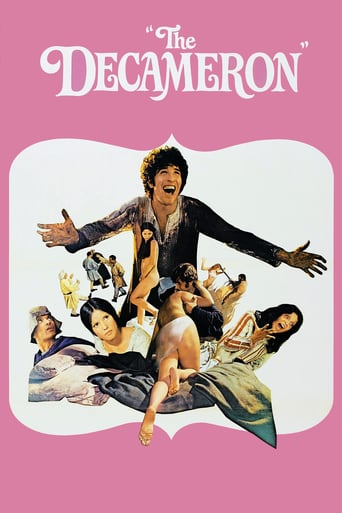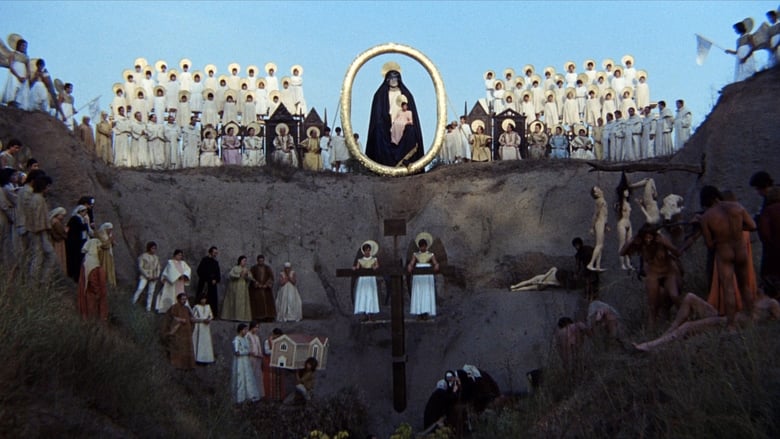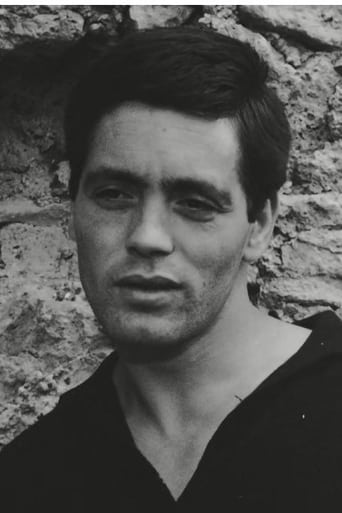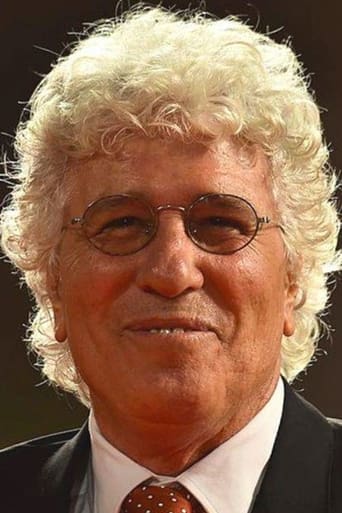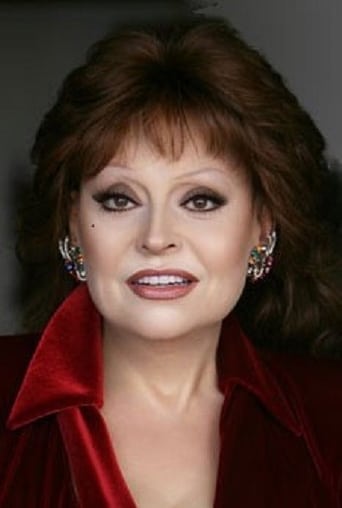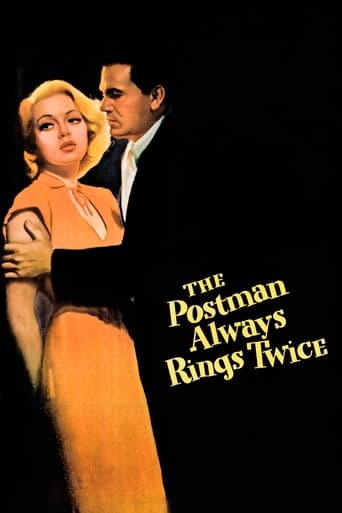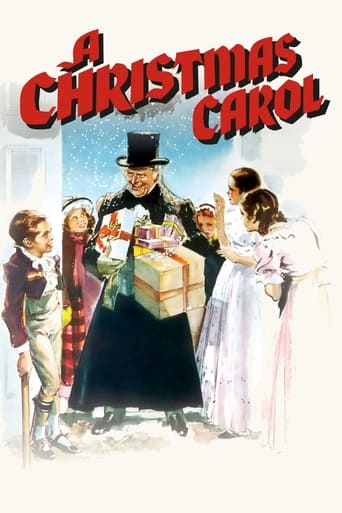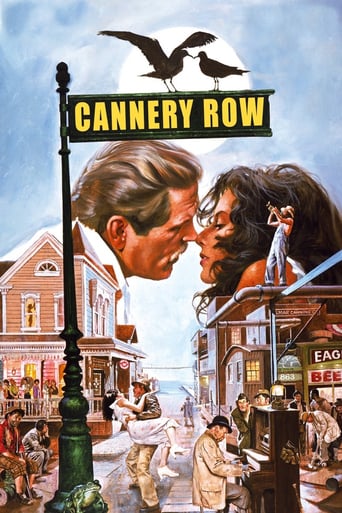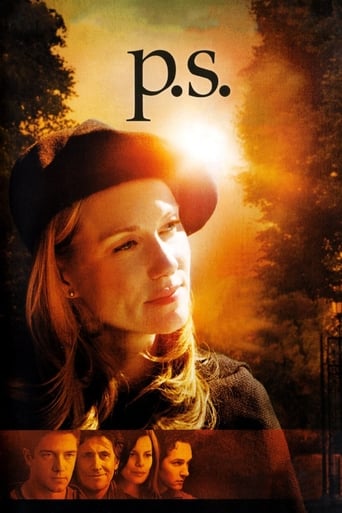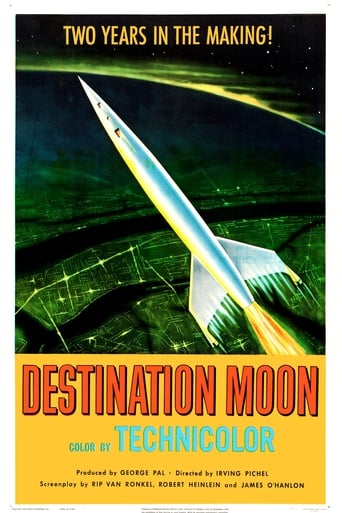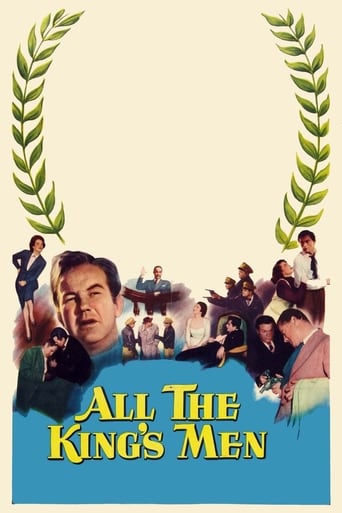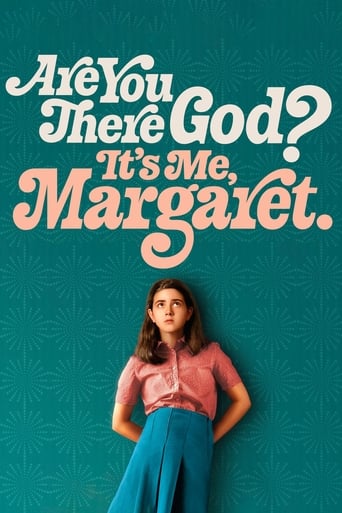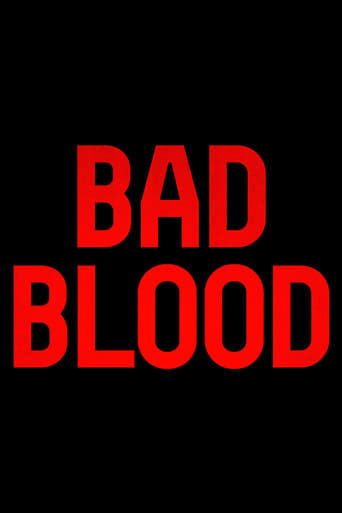The Decameron (1971)
A young Sicilian is swindled twice, but ends up rich; a man poses as a deaf-mute in a convent of curious nuns; a woman must hide her lover when her husband comes home early; a scoundrel fools a priest on his deathbed; three brothers take revenge on their sister's lover; a young girl sleeps on the roof to meet her boyfriend at night; a group of painters wait for inspiration; a crafty priest attempts to seduce his friend's wife; and two friends make a pact to find out what happens after death.
Watch Trailer
Cast
Similar titles
Reviews
Truly Dreadful Film
the audience applauded
Don't listen to the negative reviews
Don't listen to the Hype. It's awful
An adaptation of nine stories from Bocaccio's "Decameron": A young man from Perugia is swindled twice in Naples, but ends up rich; a man poses as a deaf-mute in a convent of curious nuns; a woman must hide her lover when her husband comes home early; a scoundrel fools a priest on his deathbed; three brothers take revenge on their sister's lover; a young girl sleeps on the roof to meet her boyfriend at night; a group of painters wait for inspiration; a crafty priest attempts to seduce his friend's wife; and two friends make a pact to find out what happens after death.Not surprisingly for the guy who gave us "Salo", the film contains abundant nudity, sex, slapstick and scatological humor. It is never as offensive as "Salo" is, but if you are easily taken aback by male nudity, you might want to shy away... because this film gives no care at all about your sensibility.I am not sure what issue Pasolini had with the Catholic Church, but he pokes fun at it here, as he is known to do. You might think this would be a problem in a heavily-Catholic country like Italy, but yet he has gone on to be legend, not least of all because of his courage in courting controversy.
Whenever I watch a Pasolini movie, I am invariably caught by sorrowful spasms at several very obvious technical flaws:1) Why is dubbing used so poorly? Why is the speech so often out of sync? Why, oh why! (Note that until very recent times many Italian flicks suffered from this. I personally believe this is one of the many reasons why Italian cinema, with a few exceptions, has had such a poor diffusion abroad. Movies are made so much more palatable by something as relatively simple as good lip syncing).2) Acting is mostly very poor. I am not a fan of the actors used by Pasolini. I know very well that he uses non professional actors for a reason, that is to draw more genuine emotions from them, to impress the public with fresh, interesting faces, etc. But I think that, while these effects are only partially achieved, the acting is, simply put, horribly directed. There are other instances of movie makers working with non professional actors, and it is not always bad. But with Pasolini it mostly is. In this movie (as in others) acting looks so unnatural, see e.g. Ninetto Davoli in the first episode. Of course this is magnified by what I said at point 1.3) Editing is another problem. Cuts are of uncanny lengths leaving too much silence after some character has spoken, or no silence at all. The pacing of sequences, while resulting in a certain naïveté of the narration (something that I think was intended), is mostly erratic and inconsistent. 4) Close-up abuse! When you have cast weak actors/actresses with uninteresting faces that are very poorly dubbed, the worst you can do is punctuating your movie with close-ups! And this is exactly what happens in Il Decameron. (See for example the first episode when the two burglars speak in front of the sarcophagus, with the camera shifting between the two's frontal close-ups, an especially uncanny effect).I wonder if all of the above are deliberate choices or it is just that Pasolini is not a good filmmaker in those areas. Or maybe it is just me. And the reason I say so is that I have not found (so far) reviews, especially from Italy, that significantly criticize any of those points. However, if you compare Pasolini with the craftsmanship of Italy's greatest director, Federico Fellini, it should be evident that PPP is very far from FF's technical mastery. I am not talking about their artistry or weltanschauung, just of their technical capabilities. Fellini had wonderful actors, who were well dubbed (or self-dubbed) in well edited movies, especially in the early-middle phase of his career. Now, the reason I bring forth Fellini is that Italian critics, while recognizing Fellini as superior, never seem to disprove of the obvious (for me) technical problems that oftentimes make PPP's pictures barely watchable, as if their director's intellectual worthiness, which was testified by his literary accomplishments (Pasolini was a novelist and a poet), were enough by themselves to justify the quality of his cinematic efforts.The above rant on technical faults is made all the more painful by Pasolini's patent inventiveness, coupled with solid narrative and figurative vigor. I still think that Pasolini is a great filmmaker, notwithstanding all I have said. In Il Decameron, he does capture somehow the popular grace of Boccaccio's short stories. The characters, the landscapes, the architecture, the use of dialect, all contribute to the rendering of a stunning fresco of Medieval Italy, a land where religious superstition, joie de vivre and mockery seemed, and still seem, to be all one.When you think of how beautiful and gracious the canvas outline comes out, then you can't help cursing the blotches caused by the violent, seemingly uneducated brush strokes of the maestro. And going back to the Italian critics, I really think they got it all wrong in not criticizing Pasolini's style during his career as a director, because all the praise he received from them did not stimulate him to reconsider his technique, so his entire production came out regrettably flawed.
Plenty of positive reviews on this site. The Decameron is great - the 14th-century book I mean. What I've read of it anyway, the writing is a mix of Saki and Tales of the Unexpected and holds up very well, in particular the tale about the Christian who hopes to convert his Jewish friend, who decides to go to Rome to observe the clergy to see what all the fuss is about, with unexpected results.The film can't cover something like 100 tales in the book, but the director seems to handpick the bawdy ones for our (or his) delight. But the bawdiness is unerotic, as if to highlight how comical and debasing such lusty antics. And the 'punchline' - so excellent in the story I mentioned above (which doesn't feature) - is often so weak as to be unnoticeable. You wait for something more to happen, only to find, oh, it's a new story. Okay, that was it was it? What's more, there isn't the comic touch to milk some of the set-ups properly. Frankly, some of the Carry On films do this stuff far better. It's a shame they never set a Carry On film in the medieval era actually. On the plus side, the wonderful scenery stays with you, and it is good to see women who aren't the usual Hollywood example, it does change the mindset regarding the opposite sex a bit.This is a rare example where the book (in particular the Penguin translation) is easier to dip into.
Pasolini freely adapts ten or so episodes from Boccaccio's fourteenth century collection of hundred short stories. He interweaves the tales of happy or tragic lovers, naughty nuns and lusty priests, naive husbands and cheating but quick-witted wives, inept grave robbers, and a young gardener who got more than he had bargained for, with his own meditations on art, life, death and love. Pasolini himself plays a painter Giotto who observes the characters that inspire him to paint a fresco on the church's wall. "Decameron" is the first part of Pasolini's "Trilogy Of Life", which continues with adaptations of two other celebrated works of world fiction; "The Canterbury Tales" (1972) and the "Arabian Nights" aka "A Thousand and One Nights" (1974). All these books have been known as distinguished and revered works of literature that belong to the immortal classics. There are probably so many big volumes have been written about them that it would take more than a thousand and one days and nights to read them. They talk about love, death, the meaning of life, and religion but first and most of all they entertain. At the time they were told and written down, no one would think of them as the future academic references. That's why they are so alive, earthy, coarse, and bold. I have not seen two other Pasolini's films but 'Decameron' captures the original spirit of Boccaccio's tales truthfully and with love, humanity, and perfect sense of the medieval Italy.The film has a look of a renaissance painting not only Italian Renaissance (Giotto) but Netherlandish Northern Renaissance - Peter Bruegel and Hieronymus Bosch.As he often did, Pasolin used in the film the non-professional actors to play the medieval peasants. They had none of the Hollywood glamor or classical features or perfect teeth and smiles but their faces are interesting, original, and real.Full of rustic comedy and innocence, earthy humor and lust for life "Decameron" is one of the most optimistic, and celebrating life films ever made. Its sexuality is straightforward and honest, moving and not insulting. This film, my first Pasolini made me want to see the rest of the trilogy and the rest of his films.
